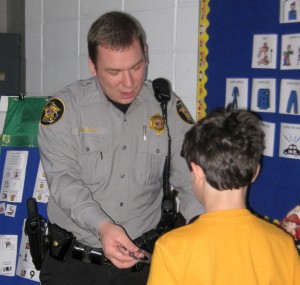Indiana Attorney General Taking School Resource Officer Push To Congress
Washington lawmakers are beginning to write the federal budget, and Indiana’s top lawyer wants to make sure they include more money for school resource officers.
Indiana Attorney General Greg Zoeller announced last week he plans to work with the state’s congressional delegation in hopes of increasing the budget of a relatively-small U.S. Justice Department grant program for hiring police officers to work in schools.
On the state level, Indiana lawmakers have already authorized $20 million in matching grants to help schools hire resource officers; districts have already claimed more than $9 million of that money.
While some criminal justice advocates question the effectiveness of such a push, it aligns with a goal Obama administration officials spelled out last January: fund the hiring of 1,000 new school resource officers across the country.
“We can’t predict the future in terms of that funding,” Zoeller spokesperson Bryan Corbin tells StateImpact. “But to the extent that there’s funding available and to the extent that our efforts can help local law enforcement and local schools to secure that funding, then we will try to assist them if we can.”The U.S. Justice Department currently spends $45 million on a national grant program for hiring school resource officers. Only one Indiana community received a grant from that program last year.
But Jeremy Haile, federal advocacy counsel for the Sentencing Project, says resource officers might not be making schools safer.
“As well-intentioned as they may be, and as well-trained as they may be to handle crime and violence on the streets, they may not be well-trained to deal with juveniles and students with mental health issues,” Haile says.
Law enforcement officials have said school resource officers do receive special training and the Attorney General’s office says more Indiana schools have asked for help in hiring them.
Haile says research has shown putting law enforcement officers in schools doesn’t necessarily decrease crime, but it can feed juveniles into the criminal justice system for offenses that educators might deal with using a suspension or expulsion.
